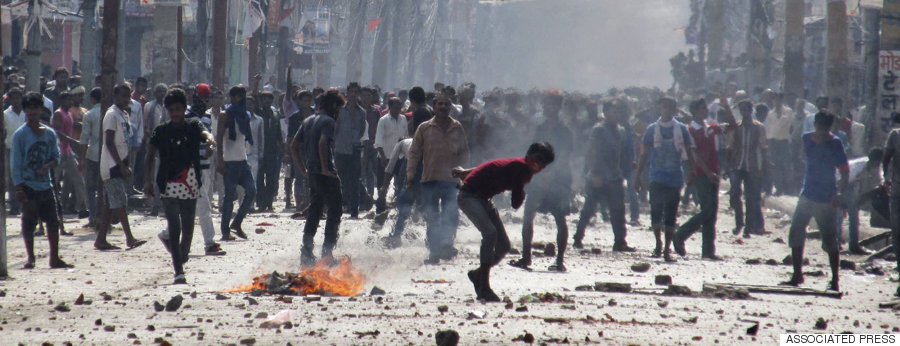Published on: 11/7/2015IST
As Violence Along India Border Spikes, Nepal Turns To China For Help

BIRGUNJ-- Nepal's busiest entry point for goods from India has witnessed a new wave of unrest after police failed to clear a border blockade, the attempt only strengthening the resolve of protesters to fight the Himalayan nation's new constitution.
Knots of demonstrators gathered around piles of smoldering tyres in Birgunj, the latest flashpoint in agitation across the southern Tarai-Madhes strip, speaking of their anger at a federal setup enshrined in the new basic law.
The lowlanders, many of them ethnically distinct from Nepal's hill and mountain groups, complain their region has been carved up, denying them a say in running the nation of 28 million as it seeks a new start after years of instability.
Stones and pieces of brick littered the streets around a clock tower on Thursday, marking where police had fought previous battles with protesters. Burned-out cars and motorbikes lay by the side of the road to the deserted bus station.
"We light fires in the morning, they (the police) come in the day and shout abuse at us, charge us with batons and shoot tear gas or bullets. We throw stones back, and sometimes petrol bombs," said Abdul Rahman at one of the fires in Birgunj.
"All of us in this crowd voted for the mainstream parties in the last election after they promised to give us a Tarai province. Now we know they have lied to us, and we are out on the streets."
The middle hills and the capital Kathmandu have suffered fuel and cooking gas shortages after protesters in the south switched to blocking supplies from India, Nepal's largest trading partner, almost two months ago.
Many in Nepal accuse India of supporting the protesters - a charge New Delhi denies. India has expressed its dissatisfaction with parts of the constitution, although it also says it cannot allow trucks to enter Nepal while conditions are unsafe.
An Indian national was shot dead by Nepali police on Monday during a protest that erupted after police cleared protesters from a highway.
In a setback for Indian Prime Minister Narendra Modi's bid to improve neighbourhood relations, Nepal has turned to China for help, getting an emergency consignment of fuel and opening seven border crossings to traders.
BATONS, TEAR GAS AND BULLETS
Since Monday's killing, police have fought running battles with protesters who threw stones and petrol bombs by the clock tower and in side streets. Around 300 protesters were camped out on the 'friendship bridge' that runs through the last section of no-man's land to the border.
Many in the Tarai have family ties across the border, although those on vigil at the bridge played down the support they receive from India.
"They have given us places to cook, and sometimes given us food during the last month. But this is natural. We have very close kinship ties," said Mahadev Kushwaha, a local high school teacher.
"The media from Kathmandu don't understand this, and say the movement is being run by India. Tarai-Madhes is a part of Nepal just like the hills are.
"But where are we in the government? In the army? In the police? Would there have been as many deaths in the last few months if more of the police in Tarai-Madhes were local people?"
Nepal's new constitution has provisions for disadvantaged groups, including Madhesis, but the gulf between Kathmandu and Tarai-Madhes is widening in the face of violence that has taken more than 40 lives.
"The promise of inclusion is completely hollow," said Ram Kishor Yadav, a leader from the Federal Socialist Forum Nepal, a Tarai-based party, who was at the bridge.
Protesters say that if the government was willing to concede to their main demand – the separation of the new provinces in the southern plains from those in the hills – the agitation would end: "We need to keep up this struggle until we are guaranteed our share in all parts of the government," said Yadav.
11/7/2015 | | Permalink
